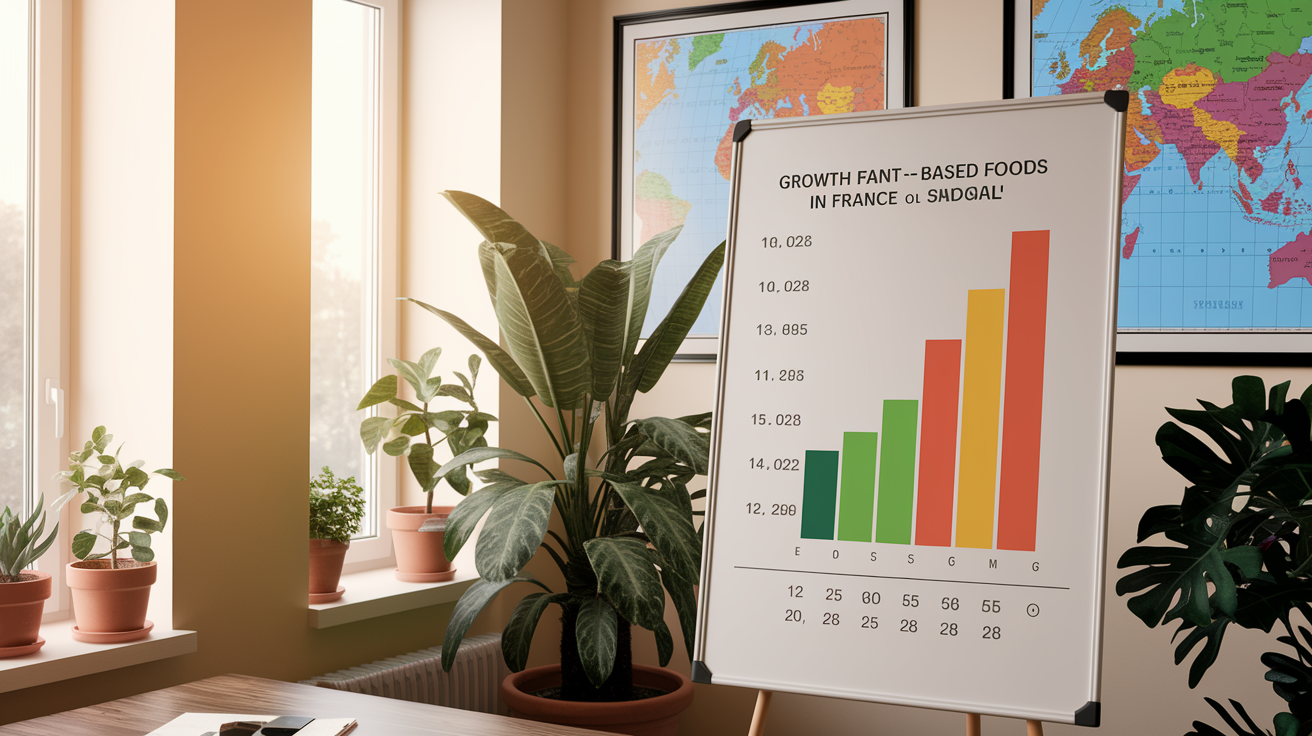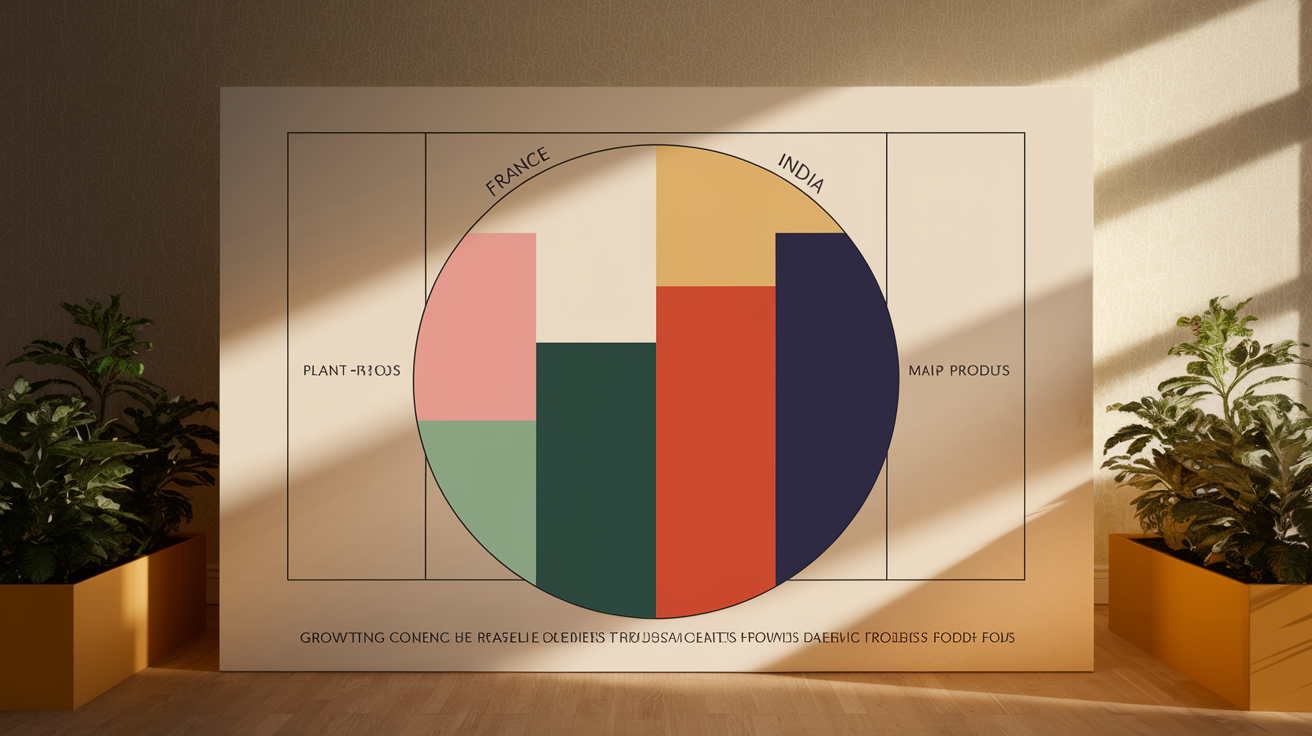The global food market is undergoing a remarkable metamorphosis, driven by a growing appetite for plant-based options and a changing attitude towards meat products. In France and India, these trends reflect shifts in consumer preferences influenced by health awareness and environmental concerns. This article explores how these changes impact growth rates and acceptance in both countries, providing valuable insights for investors and private savers.
Dynamics of Eating Habits: Plant-Based Foods vs. Meat Products in India and France

The growth rates of plant-based foods compared to meat products show interesting country-specific variations, influenced by cultural, health, and social factors. In both India and France, marked trends are emerging that could shape the future of these markets.
India
In India, a country with a diverse cultural and religious composition, an increasing number of consumers are turning to plant-based foods. This trend is strongly driven by a growing health awareness. With a large number of people traditionally eating vegetarian and a younger, health-conscious demographic, there is a noticeable increase in demand for plant-based products. The booming e-commerce sector also contributes to this, facilitating access to a variety of health-oriented products.
The demand for meat products remains stable, but growth is limited by deeply rooted cultural and religious beliefs that restrict meat consumption. These factors, along with fluctuations in raw material prices, influence market dynamics, but also leave room for innovative approaches within the plant-based diet.
France
The French nation, known for its culinary tradition, is witnessing a shift in the landscape of food preferences. A growing awareness of the importance of health and environmental protection has led to the increased popularity of plant-based products. Consumers in France are increasingly leaning towards more sustainable diets, which further stimulates growth in the plant-based segment.
Despite the traditional strength of the meat products market in France, this sector is showing restrained growth. Two main factors contribute to this: on one hand, consumer health concerns, and on the other, a greater demand for transparency and food safety. Consumers are increasingly preferring organic and local products, which also puts pressure on meat production to adapt to more sustainable practices.
Overall, the growth rates in India and France reflect a clear shift in eating habits. The majority of consumers in both countries are driven by greater awareness of their health and environmental choices, favoring plant-based foods in both markets. However, cultural and regional differences remain decisive factors influencing the evolution and preference for meat products.
Culinary Revolution: Why Acceptance of Plant-Based Foods Could Explode

The acceptance of plant-based foods compared to traditional meat products reflects fascinating cultural differences and global trends. This acceptance is influenced by a combination of tradition, health awareness, and a growing respect for the environment, all of which contribute to a culinary revolution.
Cultural Influences
In Europe and North America, we are witnessing rapid growth in the demand for plant-based products. This is largely due to the increasing environmental awareness and concern for health. In particular, young consumers are receptive to new diets that promise them both health benefits and a reduction in their ecological footprint. Brands specializing in plant-based alternatives are leading this trend, successfully capturing the interest and loyalty of an increasingly sustainability-conscious clientele.
In the Asian region, the acceptance of plant-based foods varies significantly. While in India, the plant-based diet is deeply rooted in religious and cultural practices, in countries like Japan and South Korea, traditional meat consumption is not being replaced as quickly. However, even in these nations, there is a growing curiosity for innovative plant-based products that consider both health and environmental aspects.
Global Trends
Globally, the so-called flexitarianism is gaining popularity. People who identify as flexitarian consciously limit their meat consumption without completely abandoning it. This increased flexibility is a key factor driving growth in the plant-based food market. Veganism is also experiencing, albeit in smaller percentages, remarkable growth. Countries like Austria demonstrate how a proportionally small but influential population group can impact the food supply.
Challenges and Opportunities
Despite these positive developments, plant-based foods also face challenges. Established eating habits and the strong presence of the meat industry can hinder the shift to plant-based products. Additionally, the price factor plays a significant role in economically difficult times. But here lie also opportunities: culinary innovations and a greater focus on the cost-benefit of plant-based foods could ignite a massive innovative push. Companies capable of meeting the needs of health- and environmentally-conscious consumers, while maintaining good price awareness, have the potential to establish themselves globally.
The trend towards plant-based foods appears to be driven by a number of substantial advantages. Health and environmental protection are at the center of consumer decisions. Moreover, government support through educational programs could promote acceptance and ensure that this culinary revolution continues.